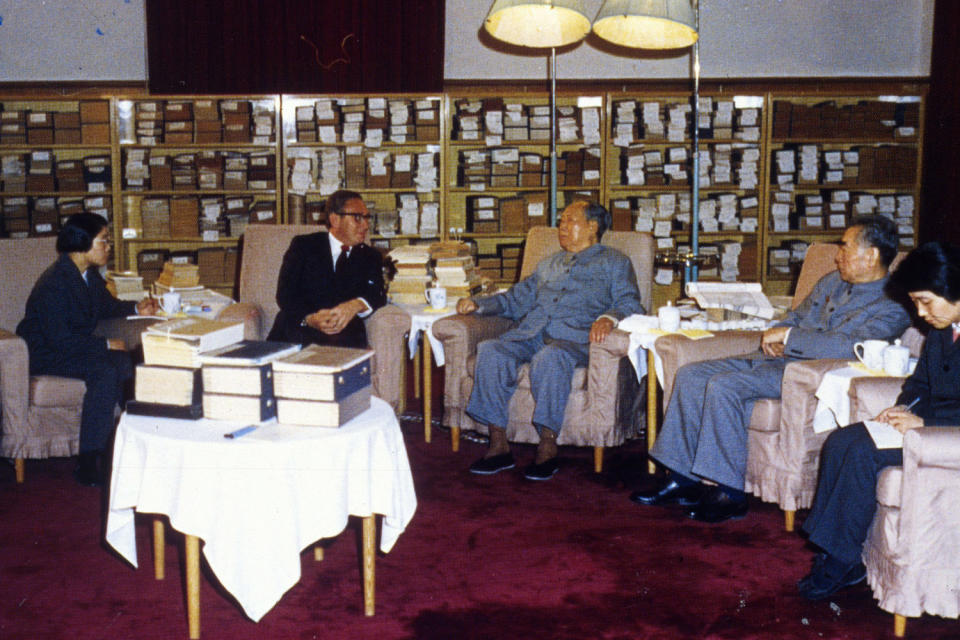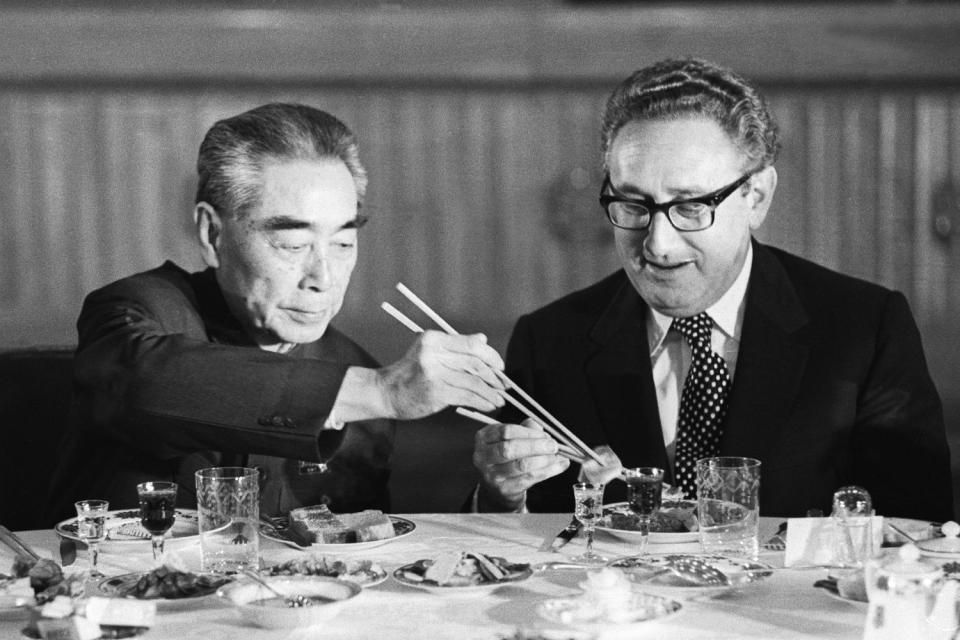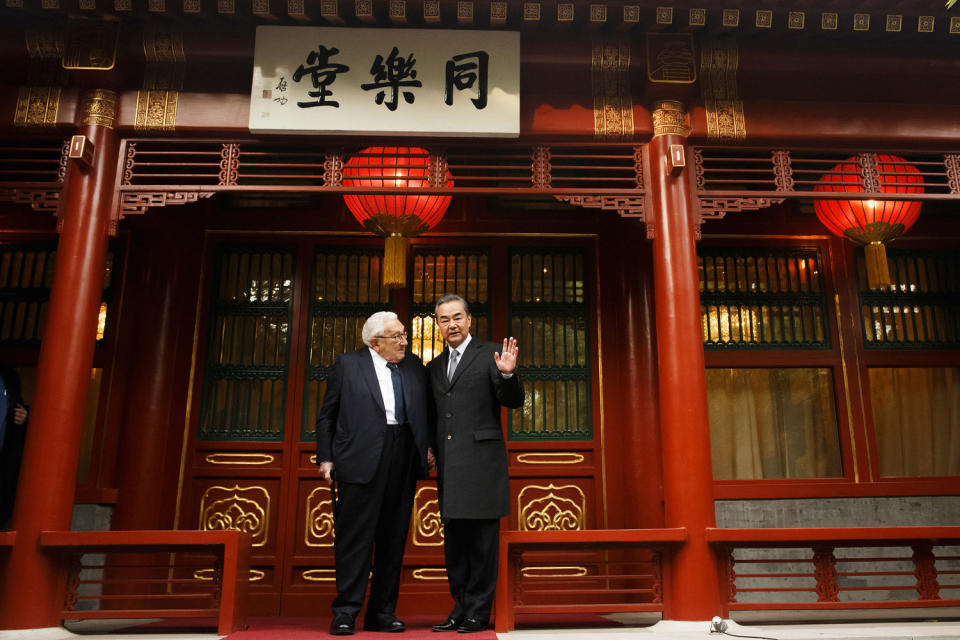China mourns ‘old friend’ Kissinger, who opened door to U.S. ties
- Oops!Something went wrong.Please try again later.
- Oops!Something went wrong.Please try again later.
- Oops!Something went wrong.Please try again later.
HONG KONG — The death of American statesman Henry Kissinger is being deeply mourned in China, where he was praised Thursday as an “old friend” for his role in the 20th-century rapprochement between the two countries.
Kissinger, 100, died Wednesday at his home in Connecticut, his consulting firm announced.
The news drew tributes from senior officials and state media in Beijing, which Kissinger had recently visited. But his decades of close ties with the ruling Communist Party often brought criticism from pro-democracy activists and dissidents, and the warm sentiments were unlikely to be shared elsewhere in Asia, where Kissinger helped wage secret Vietnam War-era U.S. bombing campaigns in Cambodia and Laos.
Kissinger was also praised by Russian President Vladimir Putin on Thursday as a “wise and farsighted statesman.”
A mixed legacy
In 1971, when he was President Richard Nixon’s national security adviser, Kissinger made a secret trip to China that laid the groundwork for a historic trip by Nixon the following year and the formalization of relations between the United States and China in 1979.
China’s opening to the U.S. after decades of global isolation under Mao Zedong helped it develop into a manufacturing powerhouse, the world’s second-largest economy and an increasingly assertive player on the global stage.
Kissinger remained highly active in China as a diplomat and businessman, and in recent years he had often expressed concern about U.S.-China relations as the two countries clashed over a range of issues including trade, technology, human rights, the status of Taiwan and China’s positions on wars in Ukraine and the Middle East.

The Chinese Foreign Ministry said Thursday that President Xi Jinping and other top officials had sent messages of condolence to President Joe Biden, calling Kissinger “an old and dear friend of the Chinese people” and “a trailblazer.”
“Both China and the U.S. should inherit and carry forward Dr. Kissinger’s strategic vision, political courage, and diplomatic wisdom,” the ministry said.
Kissinger met with Xi only a few months ago, in a surprise visit to Beijing.
“We will never forget our old friend and your historic contribution to promoting the development of Sino-U.S. relations,” Xi said at the time.
In more than 100 visits to China over more than 50 years, Kissinger met all of its modern leaders: Mao, Deng Xiaoping, Jiang Zemin, Hu Jintao and Xi. He recounted his experiences in his 2011 book “On China.”
“I would say he had a somewhat mixed legacy,” said Ian Johnson, a senior fellow for China studies at the Council on Foreign Relations.
“On the one hand, he represented a nowadays useful realpolitik way of looking at China, which is to not get caught up in ideology but to look at China as a potentially useful partner in solving global challenges facing the United States,” he told NBC News.
“On the other hand, at times he let himself be used as a prop for Chinese leaders to show their public that they had good relations with the United States, while at the same time earning handsomely for trips to China.”
Xie Feng, the Chinese ambassador to the United States, said Kissinger’s death was a “tremendous loss” for both countries and the world.
“History will remember what the centenarian had contributed to China-U.S. relations, and he will always remain alive in the hearts of the Chinese people as a most valued old friend,” he said in a post on the social media platform X.
Kissinger’s death was briefly one of the top trending topics Thursday on Weibo, a popular Chinese social media platform.

“I am convinced that Chinese-American relations depend on an understanding that the two countries have a unique ability to bring peace and progress to the world, and they also have a unique ability to destroy the world if they’re not together,” Kissinger said at an October event in New York hosted by the National Committee on U.S.-China Relations, where he was an executive vice chairman.
Chinese officials have urged more “Kissinger-style” diplomacy from the U.S., as relations have fallen to what Beijing says is the lowest point since 1979, raising concerns that competition between the two countries could veer into conflict.
Taking a hard line on China is now one of the few issues on which Democrats and Republicans can agree.
With Kissinger’s death, the U.S. and China have lost “a wise leader and a wise politician and a wise observer of China-U.S. relations,” said Wang Huiyao, founder and president of the Center for China and Globalization, a think tank in Beijing.
Kissinger’s constant reiteration of the importance of avoiding open conflict “is very, very valuable, and now we are going to miss that,” said Wang, who has met Kissinger several times.
“We haven’t had a second Kissinger,” he said. “Hopefully there will be.”
Others say it’s time to move away from the Kissinger approach.

Kissinger became “the biggest proxy of the Chinese Communist Party,” said Miles Yu, a senior fellow and director of the China Center at Hudson Institute, a conservative institute based in Washington.
Kissinger’s “amazing access” to the highest echelons of the party gave him “enormous power and prestige,” Yu said, but it also made him less an agent of change than an agent of the Chinese Communist Party’s continued rule.
For decades, Yu said, every time tensions were raised between the U.S. and China over Taiwan or other issues, Kissinger would encourage the U.S. to be conciliatory, which Yu said “encouraged hostility and belligerence by China.”
While Kissinger was right to point out the devastating consequences of potential conflict, “he chose the wrong party to blame,” said Yu, who was China policy adviser to Secretary of State Mike Pompeo in the Trump administration.

Questions have been raised about Kissinger’s defense of China given the work of his international geopolitical consulting firm, which he founded in 1982 after leaving public service.
Critics pointed out his business ties to Beijing in 1989, when Kissinger argued in an op-ed for The Washington Post against imposing sanctions on China after the government crackdown on pro-democracy protesters around Tiananmen Square in Beijing, in which hundreds, if not thousands, of people were killed.
Yu said Kissinger “failed to see the real forces that would decide the Chinese future — that’s not the Chinese Communist Party, but the Chinese people.”
“He’s a great American and he’s a great loss to our country,” Yu said. “But also I think he represents a time and zeitgeist that has long passed.”
This article was originally published on NBCNews.com

